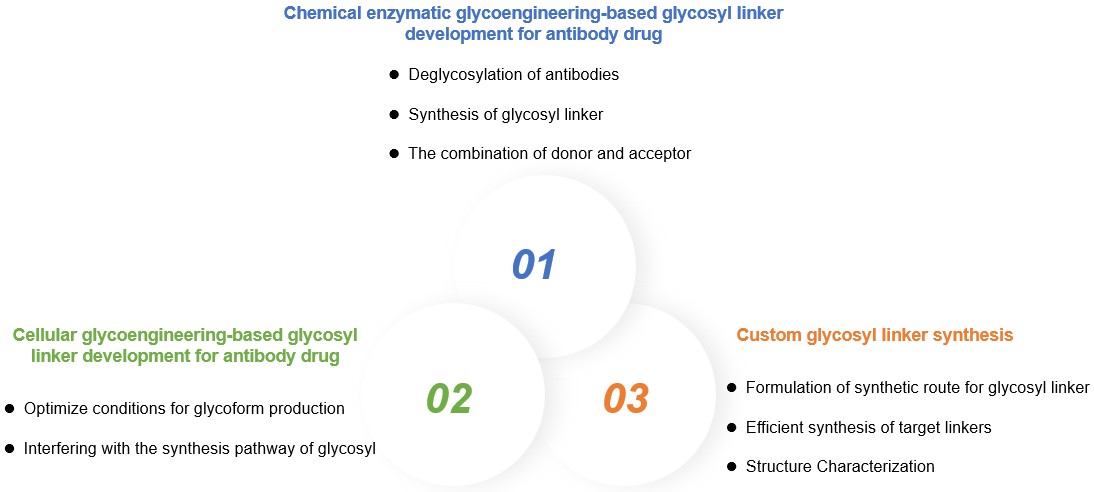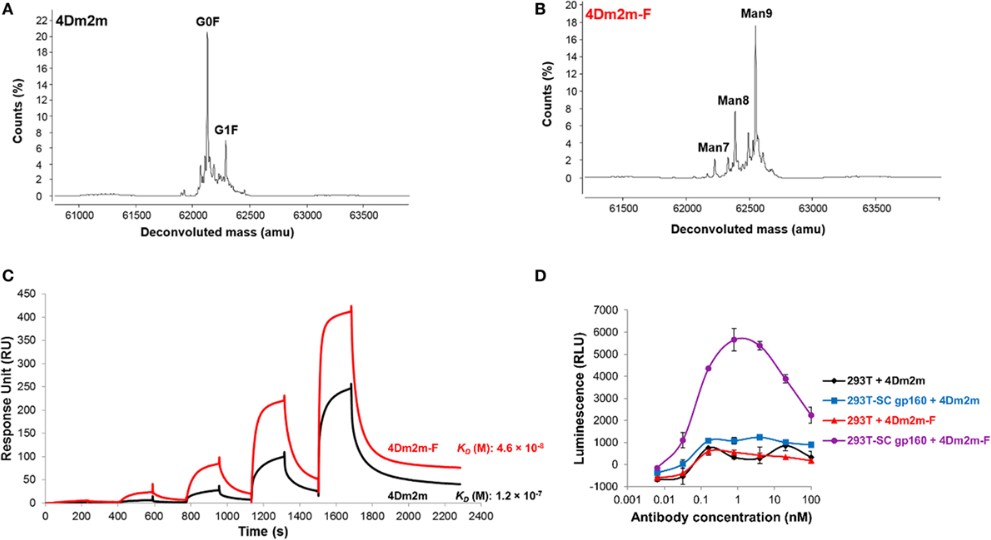Custom Glycosyl Linker Synthesis Service
Advanced synthetic strategies for custom glycosyl linkers at Creative Biolabs
Monoclonal antibody (mAb)-based drugs have been applied to various clinical diseases, such as bacterial infections, tumors, etc. Most therapeutic mAbs are glycosylated immunoglobulin (IgG) molecules whose N-glycans are bound non-covalently to asparagine residues in the crystallizable fragment (Fc). Different Fc glycoforms affect Fc-ligand interactions, thereby affecting the physicochemical properties, stability, pharmacokinetics, and safety of mAbs. Creative Biolabs has extensive experience in Therapeutic Antibody Glycoengineering. We use chemical enzymatic glycoengineering and cellular glycoengineering strategies to develop custom glycosyl linkers for antibody drugs to meet client needs.
-
Chemical enzymatic glycoengineering-based glycosyl linker development for antibody drug
Chemoenzymatic glycosylation remodeling is an effective strategy for developing therapeutic mAbs with homogeneous glycoforms. We first use endonucleases to deglycosylate IgG, and then use chemical methods to synthesize derivatives of custom N-linked glycan structures as sugar donors. The donor sugar group is transferred to the IgG acceptor under the catalysis of specific enzymes. This method is often used to develop homogeneous Fc glycoforms. Through the above steps, in vitro chemical enzymatic glycoengineering achieves precise transformation of the substrate glycosylation.
In addition, mAbs obtained through chemical enzymatic glycoengineering and drugs can be bioconjugated through appropriate chemical linkers to obtain antibody-drug conjugates. Custom glycosyl linker synthesis provides important support for antibody drug development and helps optimize the activity, stability, and pharmacokinetic properties of drugs, thereby improving the efficacy and safety of antibody drugs.
-
Cellular glycoengineering-based glycosyl linker development for antibody drug
With years of experience in antibody glycoengineering and a powerful Glycoengineering Platform, we have a variety of cellular glycoengineering strategies to support the glycosyl linker development for antibody drugs.
-
The environmental conditions of the host cell and cell type affect antibody glycosylation. For example, cells containing a less active α-1,6 fucosyltransferase are used to produce IgG with low-core fucose. Based on this, we optimize the mAb glycoform by changing the culture environment during the cell culture process. For example, adding 2-fluorofucose to the culture medium inhibits the addition of core fucose.
-
Antibody glycosylation is a multi-step synthetic process. We intervene in the synthesis pathway using enzyme inhibitors that modulate mAb glycosylation, and these enzyme inhibitors are used to synthesize specifically glycosylated mAbs.
-
We also obtain the required antibody glycoforms by modifying genes in the host biosynthetic pathway. For example, CRISPR-Cas9 technology is used to knock out the GFT gene in CHO cell lines, and a fucosylated mAb can be produced.
-
In addition, non-mammalian cell lines are applied to synthesize therapeutic antibodies. We remove the enzymes used to synthesize non-mammalian glycans and then add mammalian glycan enzymes, resulting in humanized immunogenic glycan forms.
-
Custom glycosyl linker synthesis service
In addition, Creative Biolabs also provides clients with comprehensive custom glycosyl linker synthesis services to help clients optimize the performance of antibody drugs and achieve the goals of personalized drug design. We develop optimal synthetic routes and reaction conditions to efficiently synthesize target glycosyl linkers. The synthesized glycosyl linkers are structurally characterized through mass spectrometry (MS), nuclear magnetic resonance (NMR), and other technologies to verify their purity and structure to ensure that the provided glycosyl linkers meet the expected requirements.

Publication
Technology: Cellular glycoengineering
Journal: Frontiers in Immunology
IF: 7.3
Published: 2017
Results: The authors used an α-mannosidase inhibitor (kifunensine) to produce a low-fucose, high-mannose glycoform IgG molecule. Figures A and B were the mass spectrometry analysis of the products produced before and after adding kifunensine to the culture medium. Figure C was the affinity result of the two products binding to FcγRIIIa. The affinity of 4Dm2m-F for FcγRIIIa was much higher than that of fucosylated 4Dm2m. The results in Figure D showed that the antibody activity of 4Dm2m-F was significantly improved.
 Fig.1 Enzyme inhibitors-based cellular glycoengineering.1, 2
Fig.1 Enzyme inhibitors-based cellular glycoengineering.1, 2
Advantages
-
We design and synthesize glycosyl linkers with specific structures according to client needs, and provide personalized and custom service.
-
We have advanced laboratory facilities and technology platforms to support the synthesis and analysis of complex glycosyl linkers.
-
We have extensive experience in antibody glycoengineering and provide a variety of chemical enzyme glycoengineering and cellular glycoengineering strategies to support the custom glycosyl linker synthesis for antibody drugs.
Applications
-
Drug development: Glycosyl linkers play an important role in the pharmaceutical field, which are designed as part of drug molecules to help improve the bioavailability, stability, and targeting of drugs, increase drug efficacy, or reduce toxicity.
-
Immunotherapy: Glycosyl linkers are widely applied in cancer immunotherapy. By connecting sugar groups to receptors on the surface of immune cells, the interaction between immune cells and tumor cells is enhanced, thereby improving the ability of immunity.
-
Diagnostic reagents: Glycosyl linkers are applied to prepare diagnostic reagents, which are used as markers or signaling molecules to detect specific disease markers or cell surface receptors to monitor diseases.
With our mature experience in the field of glycosyl linker synthesis and antibody drug development, Creative Biolabs provides a one-stop custom glycosyl linker synthesis service to global clients. Please contact us promptly if you need further consultation.
References
-
Li, Wei, et al. "Crystallizable fragment glycoengineering for therapeutic antibodies development." Frontiers in Immunology 8 (2017): 1554.
-
Under Open Access license CC BY 4.0, without modification.
For Research Use Only.
Related Services


 Fig.1 Enzyme inhibitors-based cellular glycoengineering.1, 2
Fig.1 Enzyme inhibitors-based cellular glycoengineering.1, 2

